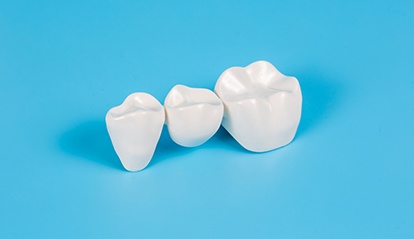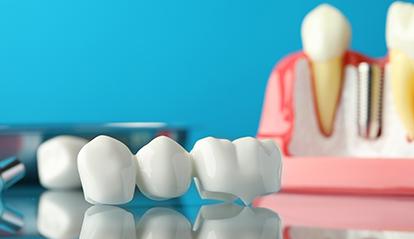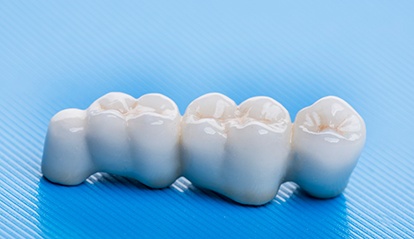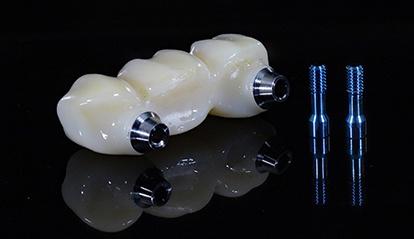
Dental Bridges – St. Albans City, VT
Bridge Gaps in Your Smile with Dental Bridges
Dental bridges are durable prosthetics that can close the gaps left in your arches following tooth loss. These functional, lifelike restorations can replace up to four consecutive teeth and must be surrounded by two healthy anchor teeth. With proper care and use, you can expect your bridge to last for up to 10 years, and because they are made with strong, sturdy materials, they can be used to eat a full diet!
Why Choose St. Albans Dental for Dental Bridges?
- Durable, natural looking materials used
- Dental insurance welcome & Flexible financing available
- Appointments start on time and never leave you feeling rushed
What is a Dental Bridge?

A dental bridge is a prosthetic designed to replace between one and four consecutive permanent teeth. Essentially, they look like a bunch of teeth stuck together, just like your real teeth do in your mouth. Dental bridges are used to close gaps in your arches so that you can still chew and speak properly despite tooth loss.
You can be an excellent candidate for a dental bridge if you are missing between one and four consecutive permanent teeth and have two healthy anchor teeth (one on each side of the gap) to secure your bridge in place.
Bridges can be made of a variety of materials, including porcelain, metal, zirconia, and resin. At St. Albans Dental, we always use natural-looking materials; however, your dentist will determine which exact material is best for your individual smile during your consultation.
Types of Dental Bridges

Because there are several different types of dental bridges available, it is important to schedule a consultation with your dentist to discuss your options. Not every bridge is ideal for every patient, as there are a variety of factors that will determine which will work best, including how many prosthetic teeth are needed and where in the mouth they’ll be going.
Traditional Dental Bridges

A traditional dental bridge works by anchoring to two healthy “abutment” teeth. To do this, your dentist will need to remove some enamel from these teeth. This procedure is permanent, so going forward you will need to either have a bridge or a crown on those teeth. Between the abutment teeth, your bridge can contain up to four consecutive dental crowns that replace the missing permanent teeth in your arch.
Benefits to this type of dental bridge include a complete looking and functional smile that can last up to ten years. Plus, because your bridge is cemented in place on your anchor teeth, you won’t need to remove it for cleaning like you would a partial denture.
Implant Bridges

Implant bridges combine the convenience of dental bridges with the permanent placement of dental implants. Dental implants are permanent tooth restorations that are surgically attached to your jawbone. Once healed, your new implant bridge will then be attached to the dental implant posts, and you’ll enjoy the confidence of a complete, functional smile.
The benefits of an implant bridge are multifold. Not only will you not need to remove your prosthetic for cleaning like you would with a denture or partial denture, because it is permanent you won’t need to replace it every ten years like you would with a traditional dental bridge. Furthermore, because your prosthetic is secured in place with dental implants, you won’t need to alter your healthy teeth to accommodate it.
The Benefits of Getting a Dental Bridge

When you’re missing permanent teeth, it can take a negative toll on your self-esteem, making you embarrassed to smile. Worse still, it can cause a variety of oral health problems, including shifting teeth and difficulties speaking and eating.
Dental bridges can bridge the gap in your smile, eliminating these issues in the process. They can allow you to once again smile with confidence, speak clearly, and fully chew your food, reducing the risk of indigestion and allowing you to eat a more nutritious diet.
If you are ready to restore your beautiful smile and close those empty spaces in your arches, please reach out to St. Albans Dental and schedule a consultation for a dental bridge today!
Dental Bridges FAQs
Can I Remove My Dental Bridge?
Many patients have heard of partial dentures being referred to as ‘removable bridges’ leading them to wonder whether these replacement teeth are intended to be frequently taken out and reinserted, like dentures.
However, the phrasing is misleading and refers to two separate solutions. Partial dentures are indeed removable, and contain the correct number of pontics (artificial teeth) to close the gaps in your grin. Meanwhile, dental bridges are cemented over either healthy abutment teeth or dental implants in your mouth, and are not intended to be taken out except by an expert, like one of our providers in St. Albans.
What are Dental Bridges Made From?
Are you worried that your restoration will stick out like a sore thumb or break easily? In the past, replacement teeth were often made from amalgam metallic mixtures that leave your grin looking dark or dirty.
Thankfully, that’s not usually the case today. Our team utilizes contemporary, durable ceramic that reflects light like enamel for a more natural appearance. Furthermore, this resilient material can be customized to be just the right tone, shape, and size to match your natural teeth for seamless results.
Does Getting a Dental Bridge Hurt?
Many people avoid getting dental work done because they assume their procedure will inevitably be long and agonizing, but that’s thankfully not the case, especially regarding dental bridges. For example, before starting your procedure, our team in St. Albans will apply a topical anesthetic as a precaution to prevent potential discomfort.
Then, you might develop temporary sensitivity after your restoration is placed until your mouth acclimates to its presence and dimensions. You can usually safely reduce associated aches or irritation with over-the-counter medications, like Tylenol or ibuprofen. If you experience ongoing or severe pain, please contact us right away to let us know. We may need to adjust your bridge to improve its fit.
How Long Do Dental Bridges Usually Last?
Typically, you can expect your restoration to last anywhere from 5 to 15 years, though it can depend significantly on your unique circumstances. For instance, it might wear down faster if it’s cover back teeth that sustain more pressure from biting and chewing. It might also last longer if it’s anchored to dental implants as opposed to abutment teeth, which can develop decay over time, leaving your bridge without a firm enough anchor.
Typically, you can extend your its lifespan by avoiding overly hard, sticky, or crunchy foods, and maintaining proper oral hygiene. You should brush and floss twice daily and visit our team every six months for a routine checkup so we can catch and treat any concerns, like a destabilized bridge, before they worsen.